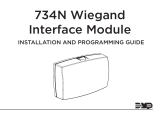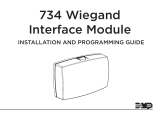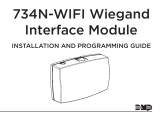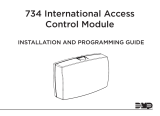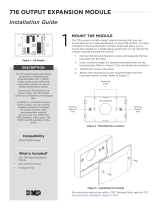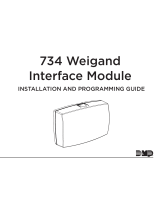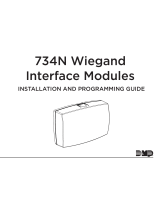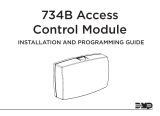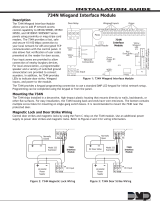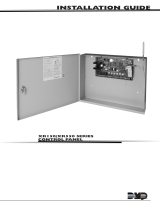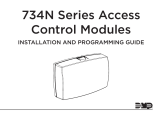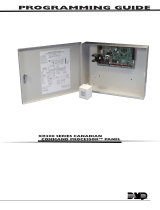Page is loading ...

INSTALLATION AND PROGRAMMING GUIDE
734 Weigand
Interface Module


Digital Monitoring Products, Inc. | 734 Installation and Programming Guide a
About the 734 ............................................. 1
Power Supply ......................................................... 1
Zone Terminals ...................................................... 1
Annunciators .......................................................... 1
Indicator LEDs ....................................................... 1
Form C Relay ......................................................... 2
Programming Connection ................................ 2
Keypad In and Out Connections ................... 2
PCB Features ...............................................3
Install the 734 .............................................4
Mount the 734 ...................................................... 4
Wire the Electronic Lock .................................. 5
Isolation Relay ...................................................... 6
Install the 333 Suppressor ............................... 7
Wire the Zone Terminals ................................... 8
Connect a Card Reader ....................................10
Set the 734’s Address ....................................... 12
TABLE OF CONTENTS
Program the 734 ....................................... 15
Program Start Display ......................................15
Initialization Option ...........................................15
Initialize Confirm Option .................................16
Activate Zone 2 Bypass ...................................16
zone 2 Bypass Time ........................................... 17
Relock on zone 2 Change ...............................17
Activate zone 3 Request to Exit ...................18
Zone 3 REX Strike Time ...................................19
Activate On-board Speaker ...........................19
Card Options ........................................................19
Custom Card Definitions ......................... 21
Wiegand Code Length .....................................21
Site Code Position and Length .....................21
User Code Position and Length ...................22
Require Site Code .............................................22
Site Code Display ..............................................22
Enter Site Code ................................................. 23
Number of User Code Digits .........................23

b 734 Installation and Programming Guide | Digital Monitoring Products, Inc.
No Communication with Panel ....................24
Remove Keypad ................................................. 25
Keypad Bus Wiring Specifications ........ 26
Compliance Listing Specifications ........27
UL Commercial Fire .......................................... 27
UL Access Control ............................................. 27
ULC Commercial Burglary
(XR150/XR550 Series Panels) ...................... 27
Certifications .............................................28
Underwriters Laboratory (UL Listed) ........ 28
International Certifications .................... 29
Intertek (ETL) Listed ........................................29
Product Specifications ........................... 30
Accessories ................................................ 31
Proximity Readers .............................................. 31
Proximity Credentials ........................................31

Digital Monitoring Products, Inc. | 734 Installation and Programming Guide 1
ANNUNCIATORS
An on-board programmable piezo provides local
annunciation at the 734. You can also connect a
variety of switched ground annunciators to the
734 for remote annunciation.
INDICATOR LEDS
The 734 provides three indicator LEDs. The red
LED turns on for the same duration as the door
strike relay. The yellow LED turns on for one
second to indicate receipt of a valid Wiegand
input. The green LED indicates that data is being
sent to the panel.
The 734 Wiegand Interface Module allows you to use the powerful built-in access control capability of
DMP Panels. DMP panels provide access control, arming, and disarming using proximity, mag-stripe,
biometric or other Wiegand-output authentication devices.
Connect a 734 to a DMP panel’s keypad bus or AX-Bus™ to use the powerful built-in access control
capability of DMP panels. The 734 includes the following features:
POWER SUPPLY
The 734 operates at 12/24VDC from the power
supply supporting a door’s magnetic lock or
door-strike. It also provides a 10 Amp Form C
relay contact for lock control.
ZONE TERMINALS
Zones 1, 2, and 3 on the 734 can be programmed
for a variety of burglary or access control
applications. Zone 4 is a class B, style A circuit
that may be programmed as a fire zone.
ABOUT THE 734

2 734 Installation and Programming Guide | Digital Monitoring Products, Inc.
FORM C RELAY
The 734’s Form C relay draws up to 35mA of
current. Refer to the NC/C/NO (Dry Contact
Relay) and the Isolation Relay sections in this
document for more information.
PROGRAMMING CONNECTION
The 734 also provides a keypad programming
connection that allows you to use a standard
DMP LCD keypad for initial setup. Programming
can be completed using a keypad connected to
the 734, or from XR150/XR550 or XR150INT/
XR550INT Series panels.
KEYPAD IN AND OUT
CONNECTIONS
The keypad in (KYPD IN) connection receives
and transmits data to the panel keypad bus or
AX-Bus™.
The keypad out (KYPD OUT) connection receives
and transmits data out to other keypad(s) or
module(s). Install a dual connector four-position
harness to allow daisy chain connection to other
devices, up to the maximum number of devices
supported. XR150 Series panels support up to 8
devices. XR550 Series panels support up to 16
devices.
When the 734 is powered from 24VDC, do
not connect devices to KYPD OUT header.

Digital Monitoring Products, Inc. | 734 Installation and Programming Guide 3
RED
PROG
J2
RED
J5
J4
KYPD OUT
S1
J3
J1
DATA
XMT LED
WIEGAND
READ LED
RELAY
ON
NC
C
NO
GRN
YEL
RED + –
ON
Piezo
1234 5 6 7 810 11 12 13 14
9
LC ASRED WHT GRN BLK Z1 Z2 Z3 Z4+ Z4–RA GND GND
KYPD IN RED
PCB FEATURES
DOOR RELAY
TERMINAL
WEIGAND
INPUTS
STATUS
INDICATOR
OUTPUTS ZONES
TO PANEL
KEYPAD BUS
OR AX-BUS
TO OTHER
KEYPAD BUS
OR AX-BUS
PIEZO
INDICATOR
LEDS
KEYPAD
PROGRAMMING
HEADER
ADDRESS DIP
SWITCHES

4 734 Installation and Programming Guide | Digital Monitoring Products, Inc.
INSTALL THE 734
The 734 comes in a high-impact plastic housing that you can mount directly to a wall, backboard,
or other flat surface.
For easy installation, the back and ends of the 734 housing have wire entrances. The back also
contains multiple screw holes that allow you to mount the 734 on a single-gang switch box. DMP
recommends mounting the 734 near the protected door.
You can also mount the 734 in a panel enclosure by following these steps:
1. Remove the 734 PCB from the plastic housing.
2. Mount the plastic standos to the panel enclosure by pressing them into place.
3. Snap the 734 onto the standos.
1MOUNT THE 734

Digital Monitoring Products, Inc. | 734 Installation and Programming Guide 5
The 734 provides a Form C (SPDT) relay for controlling locks and other electronically-controlled
barriers. The three relay terminals marked NO C NC allow you to connect the device wiring to
the relay for module control.
Use an additional power supply to power magnetic locks and door strikes. See Figures 2 and 3
for typical magnetic lock and door strike wiring.
The Form C relay draws up to 35mA of current and contacts are rated for 10 Amps (resistive)
at 12/24VDC. When connecting multiple locks to the Form C relay, the total current for all locks
cannot exceed 10 Amps. If the total current for all locks exceeds 10 Amps, problems may arise
and an isolation relay may be needed. See the Isolation Relay section for information.
2WIRE THE ELECTRONIC LOCK
PROG
J2
RED RED
KYPD IN
J4
J1
DATA
XMT LED
WIEGAND
READ LED
RELAY
ON
NCCNO
GRNYELRED
Model 333
Supressor
Normally Closed
–
+
Magnetic Door Lock
12/24VDC
Power Supply
Figure 2: Typical Magnetic
Lock Wiring
PROG
J2
RED
J1
DATA
XMT LED
WIEGAND
READ LED
RELAY
ON
NCCNO
GRNYELRED
Model 333
Supressor
Normally Open
–+
DC Door Strike
12/24VDC
Power Supply
Figure 3: Typical Door
Strike Wiring

6 734 Installation and Programming Guide | Digital Monitoring Products, Inc.
The Form C relay can control a device that draws less than 10 Amps of current. If a device draws
more than 10 Amp of current, or the sum of all devices controlled by the Form C relay exceeds
10 Amps, an isolation relay must be used. Refer to Figures 5 and 6 for isolation relay wiring.
3ISOLATION RELAY
RED
PROG
J2
RED
J5
RED
KYPD IN
J4
KYPD OUT
J1
DATA
XMT LED
WIEGAND
READ LED
RELAY
ON
NCCNO
GRNYELRED + –
Piezo
Model 333
Supressor
Normally Open
–+
Magnetic Lock
–+
Isolation Relay
To Panel
Keypad Bus
12/24VDC
Power
Supply
NCCNO
Figure 4: Magnetic Lock with
an Isolation Relay
RED
PROG
J2
RED
J5
RED
KYPD IN
J4
KYPD OUT
J1
DATA
XMT LED
WIEGAND
READ LED
RELAY
ON
NCCNO
GRNYELRED + –
Piezo
Model 333
Supressor
Normally Open
–+
DC Door Strike
–+
Isolation Relay
To Panel
Keypad Bus
12/24VDC
Power
Supply
NCCNO
Figure 5: Door Strike with an
Isolation Relay
(optional)

Digital Monitoring Products, Inc. | 734 Installation and Programming Guide 7
Use the included 333 suppressor with the
734 to suppress any surges caused by
energizing a magnetic lock or door strike.
Install the 333 across the 734 C (common)
and NO (normally open) or NC (normally
closed) terminals.
If the device being controlled by the relay is
connected to the NO and C terminals, install
the suppressor on the NO and C terminals.
Conversely, if the device is connected to
the NC and C terminals, install the 333
Suppressor on NC and C terminals.
The suppressor wire is non-polarized. Install
the suppressor as shown in Figure 6.
4INSTALL THE 333 SUPPRESSOR
RED
PROG
J2
734 Interface Module
RED
J5
RED
KYPD IN
J4
KYPD OUT
J1
DATA
XMT LED
WIEGAND
READ LED
RELAY
ON
NCCNO
GRNYELRED
+ –
Piezo
Figure 6: 333 Suppressor
Installation on the 734

8 734 Installation and Programming Guide | Digital Monitoring Products, Inc.
Terminals 8 through 12 connect grounded zones 1 through 3. These zones have a grounded side
and cannot be used for fire-initiating devices. Zones 2 and 3 can also be used for access control
with zone 2 providing a bypass feature and zone 3 providing request to exit functionality.
Terminals 13 and 14 connect to zone 4. Zone 4 provides a non-powered Class B ungrounded
zone suitable for connection to fire devices such as heat detectors or pull stations.
Note: You must provide a mechanical means of resetting four-wire smoke detectors or
other latching devices on zone 4. The panel does not drop power to the keypad bus or
AX-Bus when a Sensor Reset is performed.
Use the supplied 311 1K Ohm end-of-line (EOL) resistors on each zone. Refer to the panel
programming guide for programming instructions. See the table below and Figure 7 for more
information on wiring the zone terminals.
5WIRE THE ZONE TERMINALS
ZONE # RECOMMENDED DEVICE RESIDENTIAL FIRE DEVICES?
1 Any burglary device No
2 Door Contact No
3 REX (PIR or Button) No
4 Any device Yes
Table 1: 734 Zone Uses

Digital Monitoring Products, Inc. | 734 Installation and Programming Guide 9
Zone 1
Zone 2
Zone 3
Zone 4
1234 5 6 7 810 11 12 13 14
9
LC ASRED WHT GRN BLK Z1 Z2 Z3 Z4+ Z4–RA GND GND
1K EOL
1K EOL
1K EOL
1K EOL
Figure 7: 734 Zone Terminal Wiring

10 734 Installation and Programming Guide | Digital Monitoring Products, Inc.
The 734 provides direct 12/24VDC, 200mA output to the reader on the RED terminal connection.
Figure 8 shows a reader with wire colors RED, WHT, GRN, and BLK connecting to terminals 1, 2,
3, and 4.
The green wire carries Data Zero (D0), and the white wire carries Data One (D1). The red wire
connects 12/24VDC, 200mA maximum power and the black wire is ground.
The wire colors may be dierent depending on the reader being installed. Refer to the literature
provided with the reader for wire coding, wire distance, cable type (such as shielded), and other
specifications.
Card Reader LED Operation
To provide visual indication of a valid card read, the card reader can be wired to illuminate the
green LED for the duration of the door strike.
Connect the orange or brown wire to terminal 5 to have the green LED stay on for the duration
of the relay activation.
Card Reader Annunciation
Connect the yellow wire to terminal 6 to have the remote annunciator turn on anytime the panel
instructs the 734 on-board piezo to turn on.
6CONNECT A CARD READER (optional)

Digital Monitoring Products, Inc. | 734 Installation and Programming Guide 11
Figure 8: Card Reader Wiring
1234 5 6 7 810 11 12 13 14
9
LC ASRED WHT GRN BLK Z1 Z2 Z3 Z4+ Z4–RA GND GND
J3
ON
Card Reader
Red (12/24VDC)
White (Data 1)
Black (GND)
Green (Data 0)
Shield
Orange/Brown
Yellow

12 734 Installation and Programming Guide | Digital Monitoring Products, Inc.
To set the 734 address, move the DIP switches on the PCB to the appropriate positions. See the
following sections, Figures 9 and 10, and Table 2 to determine how to set keypad bus or AX-Bus
addresses.
7SET THE 734’S ADDRESS
Keypad Bus Addresses Explained
Each keypad bus address can
accommodate one door output and four
expansion zones.
A 734 with an address of 2 on the keypad
bus would represent door 2 and zones
21-24. A 734 with a keypad address of 14
would represent door 14 and zones 141-144.
ON
1 2 3 4
ON
1 2 3 4
ON
1 2 3 4
ON
1 2 3 4
ON
1 2 3 4
ON
1 2 3 4
ON
1 2 3 4
ON
1 2 3 4
ON
1 2 3 4
ON
1 2 3 4
ON
1 2 3 4
ON
1 2 3 4
ON
1 2 3 4
ON
1 2 3 4
ON
1 2 3 4
2 3 4
5 6 7 8
9 10 11 12
13 14 15 16
Figure 9: 734 Keypad Bus
Addresses

Digital Monitoring Products, Inc. | 734 Installation and Programming Guide 13
1 2 3 4
5 6 7 8
9 10 11 12
13 14 15 16
ON
1 2 3 4
ON
1 2 3 4
ON
1 2 3 4
ON
1 2 3 4
ON
1 2 3 4
ON
1 2 3 4
ON
1 2 3 4
ON
1 2 3 4
ON
1 2 3 4
ON
1 2 3 4
ON
1 2 3 4
ON
1 2 3 4
ON
1 2 3 4
ON
1 2 3 4
ON
1 2 3 4
ON
1 2 3 4
Figure 10: 734 AX-Bus
Addresses
AX-Bus Addresses Explained
XR550 panels are capable of access control
expansion using any of the five AX/LX-Bus
headers (AX/LX500, 600, 700, 800, and 900).
An AX-Bus address can accommodate one door
output and one expansion zone. Because the
734 has a built-in four-zone expander, three extra
zones will be mapped to the 734 automatically.
A 734 with an address of 1 on AX500 would
represent door 501 and zones 501-504. A 734
with an address of 2 on AX500 would represent
door 505 and zones 505-508. A 734 with an
address of 1 on AX700 would represent door 701
and zones 701-704.
Note: Hardwired zone expanders and
addressable points and modules do not
communicate on an AX-Bus. AX-Bus
doors do not have programmable device
or communication types and do not have
assignable display areas.

14 734 Installation and Programming Guide | Digital Monitoring Products, Inc.
734 Address Table
To set the 734 address, move the DIP switches to the appropriate positions. See Figures 9 and 10 for
how to place the DIP switches for keypad bus and AX-Bus addresses.
Table 2: Device Addresses and 734 Zone Numbers
DEVICE/
DOOR ZONES DEVICE/
DOOR ZONES DEVICE/
DOOR ZONES DEVICE/
DOOR ZONES DEVICE/
DOOR ZONES DEVICE/
DOOR ZONES
1 11-14 501 501-504 601 601-604 701 701-704 801 801-804 901 901-904
2 21-24 505 505-508 605 605-608 705 705-708 805 805-808 905 905-908
3 31-34 509 509-512 609 609-612 709 709-712 809 809-812 909 909-512
4 41-44 513 513-516 613 613-616 713 713-716 813 813-816 913 913-916
5 51-54 517 517-520 617 617-620 717 717-720 817 817-820 917 917-920
6 61-64 521 521-524 621 621-624 721 721-724 821 821-824 921 921-924
771-74 525 525-528 625 625-628 725 725-728 825 825-828 925 925-928
8 81-84 529 529-532 629 629-632 729 729-732 829 829-832 929 929-932
9 91-94 533 533-536 633 633-636 733 733-736 833 833-836 933 933-936
10 101-104 537 537-540 637 637-640 737 737-740 837 837-840 937 937-940
11 111-114 541 541-544 641 641-644 741 741 -744 841 841-844 941 941-944
12 121-124 545 545-548 645 645-648 745 745-748 845 845-848 945 945-948
13 131-134 549 549-552 649 649-652 749 749-752 849 849-852 949 949-952
14 141-144 553 553-556 653 653-656 753 753-756 853 853-856 953 953-956
15 151-154 557 557-560 657 657-660 757 757-760 857 857-860 957 957-960
16 161-164 561 561-564 661 661-664 761 761-764 861 861-864 961 961-964

Digital Monitoring Products, Inc. | 734 Installation and Programming Guide 15
PROGRAM THE 734
When you program a 734, you can use a keypad connected to the 734 programming header and set
to address 1. For 12 Volt applications, connect the keypad to the module using a Model 330 4-wire
harness. For 24 Volt applications, connect the keypad to the module using a Model 330-24 4-wire
programming harness with in-line resistor.
Do not connect a keypad using a standard Model 330 harness if using a 24 volt power supply!
Damage to the keypad could occur.
You can also program the 734 from an XR150/XR550 Series panel. If you choose to program the
734 from the panel, all future programming should be performed through the panel. The panel’s
programming overrides any programming performed from a keypad connected to the 734.
While the 734 is in programming mode, it will not be able to communicate with the panel.
PROGRAM START DISPLAY
When you connect the keypad to the 734 module, the version number
and release date display. Press CMD to enter the Programming Menu.
INITIALIZATION OPTION
These options can set the 734 module programming memory back to
factory defaults. Press any select key or area to enter the initialization
menu.
734 PROGRAMMING
VER VVV MM/DD/YY
INITIALIZE ALL?
NO YES

16 734 Installation and Programming Guide | Digital Monitoring Products, Inc.
INITIALIZE CONFIRM OPTION
After selecting YES to clear the Access Options, the 734 displays
SURE? YES NO for confirmation to clear the memory. This is a
safeguard against accidentally erasing the programming. No memory
is cleared from the programming until you answer YES to the SURE?
option. Selecting NO leaves communication options unchanged.
ACTIVATE ZONE 2 BYPASS
Select YES to activate the zone 2 bypass operation. Selecting NO
allows standard zone operation on zone 2. The default is NO.
If the door being released by the 734 module is protected (contact
installed), a programmable bypass entry/exit timer can be provided
by connecting its contact wiring to the 734 module zone 2. When
the on-board Form C relay activates and the user opens the door
connected to zone 2, the zone is delayed for the number of seconds
programmed in ZONE 2 BYPASS TIME allowing the user to enter/exit
during an armed period.
If zone 2 does not restore (door closed) within the programmed time,
the piezo sounds every other second during the last ten seconds.
If zone 2 restores prior to the end of the programmed time, the
piezo silences. If the zone does not restore before the programmed
time, the 734 ends the bypass and indicates the open or short zone
condition to the panel.
ARE YOU SURE?
YES NO
ACTIVATE ZONE 2
BYPASS? NO YES
/
